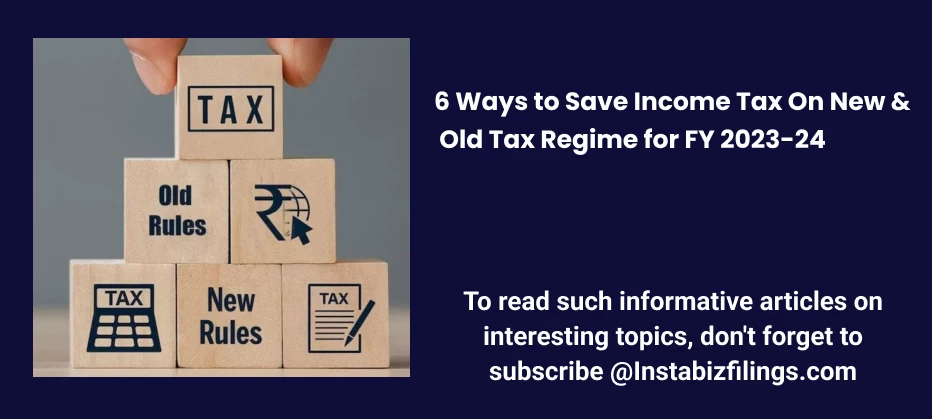
6 Ways to Save Income Tax On New & Old Tax Regime for FY 2023-24
July 31, 2024 by Team Instabizfilings
Budget 2024 Updates
-
FM Nirmala Sitharaman has presented the Budget 2024-25 proposing a Save Income Tax structure for the FY 2024-25
|
Tax Slab for FY 2024-25 |
Tax Rate |
|
Upto₹ 3 lakh |
Nil |
|
₹ 3 lakh -₹ 7 lakh |
5% |
|
₹ 7 lakh - ₹ 10 lakh |
10% |
|
₹ 10 lakh - ₹ 12 lakh |
15% |
|
₹ 12 lakh - ₹ 15 lakh |
20% |
|
More than 15 lakh |
30% |
-
Under the new tax regime, the standard deduction has been raised to Rs.75,000. However, for the Financial Year 2023-24, the standard deduction will remain unchanged.
-
The family pension deduction has been increased from Rs 15,000 to Rs.25,000.
-
The deduction for an employer's contribution to the pension scheme has been increased to 14% of salary plus Dearness Allowance (DA), from the previous limit of 10%.
Deductions and Exemptions for Tax Savings Under the New Tax Regime
The new tax regime introduced in the 2024 Budget features several updates designed to streamline the tax system and offer greater relief to taxpayers. Here are the key deductions and exemptions available under the new tax regime:
1. Increased Standard Deduction
-
Current Limit: The standard deduction has been increased from Rs. 50,000 to Rs. 75,000.
-
Applicability: This deduction is available to salaried individuals and pensioners.
2. Enhanced Family Pension Deduction
-
Current Limit: The deduction for family pension has been raised from Rs. 15,000 to Rs. 25,000.
-
Applicability: This benefit is available to individuals receiving family pensions.
3. Increased Deduction for Employer's Pension Contribution
-
Current Limit: The deduction for an employer's contribution to the pension scheme has been increased to 14% of salary plus Dearness Allowance (DA), up from the previous 10%. which can be reflected in the salary slip format to ensure clarity and transparency in salary computations
-
Applicability: This applies to employees contributing to pension schemes such as EPF (Employee Provident Fund), NPS, etc.
4. Deductions for Investments and Savings
-
Section 80C: Deductions up to Rs. 1.5 lakh for investments in specified instruments like PPF, ELSS, NPS, etc.
-
Section 80D: Deductions for health insurance premiums, capped at Rs. 25,000 for individuals and an additional Rs. 5,000 for preventive health check-ups.
-
Section 80TTA: Deduction for interest on savings bank accounts, up to Rs. 10,000.
This information can be useful when evaluating financial standing for purposes such as obtaining a Bank Solvency Certificate.
5. Home Loan Benefits
-
Interest on Home Loan: Deduction up to Rs. 2 lakh for self-occupied property and no limit for rented property tax.
-
Principal Repayment: Deduction under Section 80C, up to Rs. 1.5 lakh.
6. Education and Tuition Fees
-
Section 80E: Deductions available for interest on education loans.
-
Section 80C: Deduction for tuition fees paid for up to two children.
7. Donations
-
Section 80G: Deductions for donations to specified charitable organizations, subject to certain limits.
8. Disability Benefits
-
Section 80DD: Deductions for expenses on the maintenance of a dependent with a disability.
-
Section 80U: Deductions for individuals with disabilities.
Other Tax Saving Options Beyond Section 80C
-
Home Loan Interest: Interest paid on a home loan can be claimed as a deduction under Section 24, up to Rs 2 lakh. Additionally, Sections 80EE and 80EEA allow you to claim a deduction of up to Rs 50,000 on home loan interest, subject to certain conditions, which are over and above the limit of Section 24.
-
Charitable Donations: Any charity made to institutions or funds can be claimed as a deduction under Section 80G.
-
Education Loan Interest: Deductions for interest paid on education loans are available under Section 80E.
-
Employer Contribution to NPS: Employer contributions to the National Pension System (NPS) are eligible for deduction under Section 80CCD(2), with an overall threshold of Rs 750,000, including the employer's contribution to the Provident Fund (PF).
-
Individual Contributions to NPS: Deductions for individual contributions to the National Pension System (NPS) are available under Section 80CCD(1B), with a limit of Rs 50,000 per annum.
-
Rent Paid by Non-Salaried Individuals: Section 80GG provides a deduction for non-salaried individuals, allowing them to claim a deduction of up to Rs 60,000 per annum for the rent being paid on accommodation.
-
Savings Bank Interest: Section 80TTA provides a deduction of up to Rs 10,000 on savings bank interest for individuals under 60 years of age. For senior citizens, Section 80TTB allows deductions of up to Rs 50,000 on all interest incomes.
This information can be relevant when applying for financial documents such as an Income Certificate MP.
Disclaimer
The information provided in this blog is purely for general informational purposes only. While every effort has been made to ensure the accuracy, reliability and completeness of the content presented, we make no representations or warranties of any kind, express or implied, for the same.
We expressly disclaim any and all liability for any loss, damage or injury arising from or in connection with the use of or reliance on this information. This includes, but is not limited to, any direct, indirect, incidental, consequential or punitive damage.
Further, we reserve the right to make changes to the content at any time without prior notice. For specific advice tailored to your situation, we request you to get in touch with us.

Need more details? We can help! Talk to our experts now!
Start Your Business Registration – Talk to Our Experts Now!

Still Confused?
Talk to experts? Fill in the information and we will reach out in 24 Working Hours.

